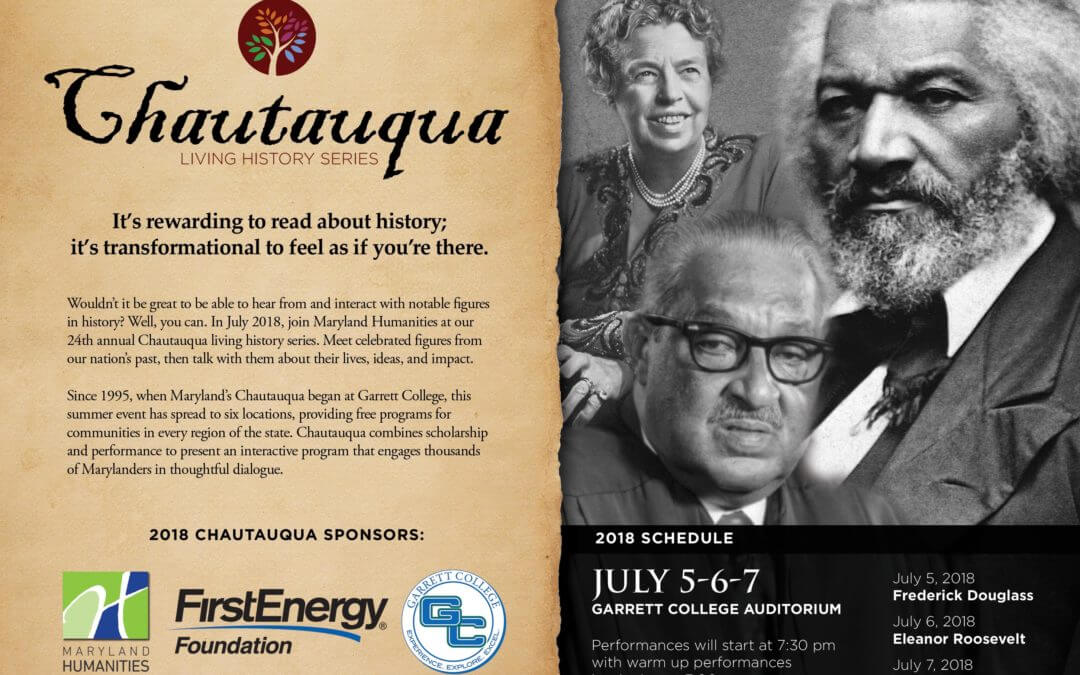Written By: Mary Helen Spear
Wouldn’t it be great to be able to hear from and interact with notable figures in history? Well, on July 5th, 6th, and 7th, you can. Join Maryland Humanities and the Garrett Lakes Arts Festival at our 24th annual Chautauqua living history series. The programs begin at 7 PM in the Garrett College auditorium with local performers, followed by the main Chautauqua presentation.
July 5 Frederick Douglass
Two of the three individuals presented at this year’s Chautauqua were born in Maryland. One of them was born into slavery. Frederick Douglass, born around 1818 in Talbot County on the Eastern Shore, broke free from slavery by fleeing north when he was twenty. In the years following his escape he became a well-known public speaker and author as well as an activist who promoted the rights of African Americans and women.
Following the publication of his autobiography in 1845, worried that he could be recaptured and returned to Maryland, Douglass traveled to Ireland and for the next two years lived in Ireland and Britain. During this time he often spoke to large crowds on the evils of slavery. After his British supporters raised the money to purchase his legal freedom, he returned to the United States as a free man.
Upon his return to America, Douglass continued to speak out against slavery, becoming a leader in the abolitionist movement. During the early years of the Civil War, Douglass conferred with President Abraham Lincoln and, later, President Andrew Johnson. Following the war, Douglass was appointed to several political positions and served as an ambassador to the Dominican Republic. Tireless in his push for equality and rights, his work would serve as an inspiration for the Civil Rights Movement of the 1960s. To this day his autobiography and his tireless advocacy make him one of the most influential African Americans of the 19th century.
Douglass will be portrayed by Bill Grimmette, a living history interpreter, storyteller, actor, and motivational speaker who has appeared as Martin Luther King, Jr., W.E.B. DuBois, and Benjamin Banneker at Chautauquas in Maryland, Colorado, and South Carolina.
July 6 Eleanor Roosevelt
Arthurdale, in nearby Preston County, West Virginia, was the first New Deal community established during President Franklin Delano Roosevelt’s administration. Arthurdale was intended as a demonstration project for unemployed coal miners where each family would receive a modest home, a small subsistence farm, and the opportunity to work in simple industries. This community became one of first lady Eleanor Roosevelt’s chief priorities and, committed to seeing Arthurdale succeed, she regularly visited the community where she attended school graduations, joined residents for dances, and participated in other celebrations. Before planning a visit to historic Arthurdale (there is a Visitors’ Center and tours are available), come to our Chautauqua to meet Eleanor Roosevelt.
Eleanor Roosevelt is often credited with redefining the role of First Lady. Focusing on the country’s poor, children’s issues, and women’s rights, she held press conferences, penned a newspaper column, and worked on behalf of the Women’s League of Voters. Following the death of her husband, President Harry Truman appointed her as a delegate to the United Nations General Assembly where she continued to focus on human rights.
She will be portrayed by Susan Marie Frontczak, a writer, speaker, living history presenter, and storyteller. Frontczak has appeared throughout the United States as Marie Curie, Clara Barton, Mary Shelley, and Irene Castle.
July 7 Thurgood Marshall
Born in Baltimore in 1908, Thurgood Marshall was legal counsel for the NAACP and the first African American Supreme Court Justice. As legal counsel for the NAACP, he won 29 of the 32 cases he argued before the Supreme Court, one of the most famous being Brown vs. Board of Education which led to the beginning of school desegregation.
President Lyndon Johnson appointed Marshall to the Supreme Court in 1965. In his 24-year tenure before retiring in 1991, he voted to uphold racial and gender affirmative action policies in every case in which they were challenged. His view of the Constitution was that the government had the duty to provide certain important benefits to people. These included education, legal services, and access to courts, regardless of people’s ability to pay for them.
Marshall saw segregation first-hand when he grew up in Baltimore. He wanted to attend the University of Maryland’s law school but could not since it was segregated. He went to the Howard University Law School instead, where he graduated first in his class.
He will be portrayed by Brian Anthony Wilson, a film and television actor and producer who will perform a scene from the play Thurgood by George Stevens, Jr., followed by a dialogue with Lenneal Henderson. Henderson is an internationally recognized scholar who brought Marshall to life in the 2010 Maryland Humanities Chautauqua tour.
Disclaimer: The views and opinions expressed in Chautauqua are the performers’ interpretations of the historical figures and do not necessarily reflect the views or position of Maryland Humanities, Chautauqua host sites, our funders or GLAF. Performances do not contain adult content, but there is some use of a deeply offensive and disrespectful term that is used in its historical context and is a direct quote from the historical figure portrayed.

